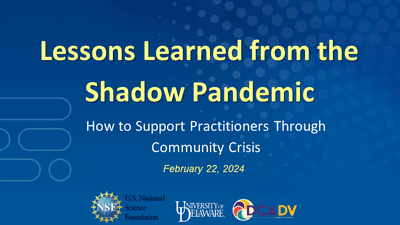Lessons Learned from the Shadow Pandemic
-
Recorded 02/22/2024; 80 minutes
The United Nations called domestic violence (DV) during COVID-19 a “shadow pandemic” with gender-based violence increasing to unprecedented levels. Research documents increases in DV following all types of disasters and rates remain elevated even after the acute danger has passed. As rates of DV rise, so does demand for services. However, disasters including the COVID-19 pandemic negatively impact the environments where services are provided, making it difficult for community-based programs to meet both pre-existing needs and the increased needs associated with the public health emergency. Understanding the unique burdens resulting from the pandemic requires consideration of factors across the fields of public health and gender studies. In late 2020, an interdisciplinary team at UD comprised of researchers from the University of Delaware’s Epidemiology and Master of Public Health program and UD’s Center for the Study and Prevention of Gender-Based Violence came together to collaboratively examine the effects of the pandemic on the provision of services to victims and survivors of DV. The interdisciplinary team incorporates expertise from a public health approach to disasters while also including feminist-based, trauma-informed, and empowerment perspectives. Further, the project was guided by a community-engaged research process, collaborating with Delaware community-based partners to inform study design.
This webinar, presented in collaboration with the Delaware Coalition Against Domestic Violence, will present these research findings through the lens of insights and lessons from both public health and domestic violence practitioners. The presentation will extrapolate on the merits of collaborative research approaches that include community/practitioner partnerships and will share ways in which frameworks and tools from multiple disciplines can strengthen the study of domestic violence. Finally, a forward analysis of resource development and implementation will provide concrete methods of support and centering for survivors and practitioners in order to improve emergency preparedness for this and other complex social service systems.
Presenters:
- Lauren Camphausen, MPH Program Manager, Epidemiology Program, University of Delaware
- Ruth Fleury-Steiner, PhD, Associate Professor Department of Human Development and Family Sciences, University of Delaware
- Jennifer Horney, PhD, MPH Professor and Founding Director, Epidemiology Program, University of Delaware
- Susan Miller, PhD, Professor, Department of Sociology and Criminal Justice, University of Delaware
- Sue Ryan, Executive Director, Delaware Coalition Against Domestic Violence
Helpful Links and Resources





